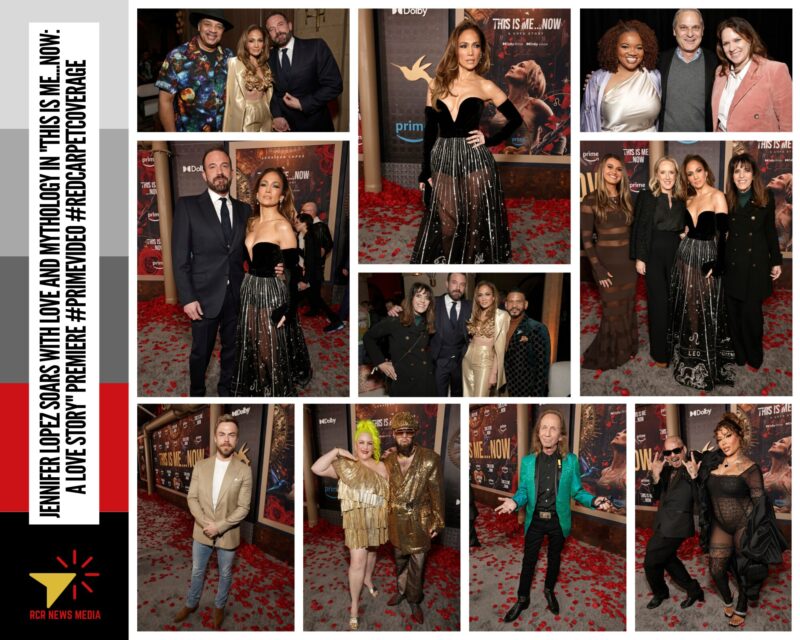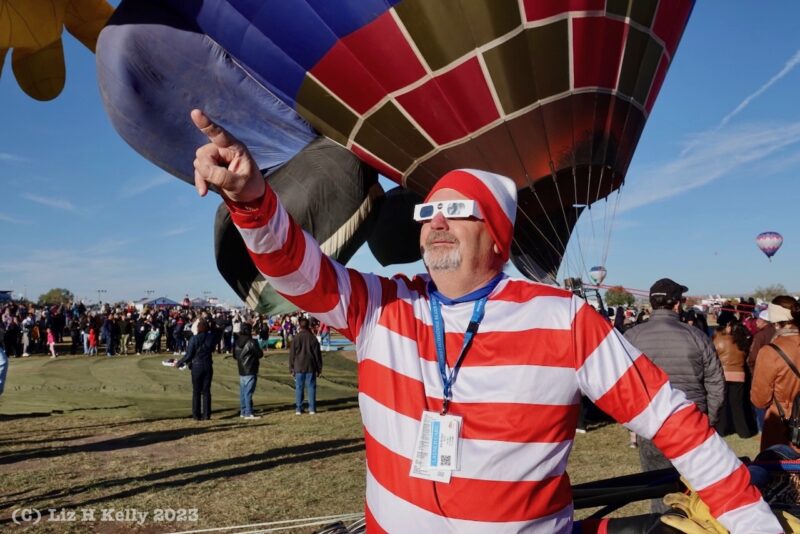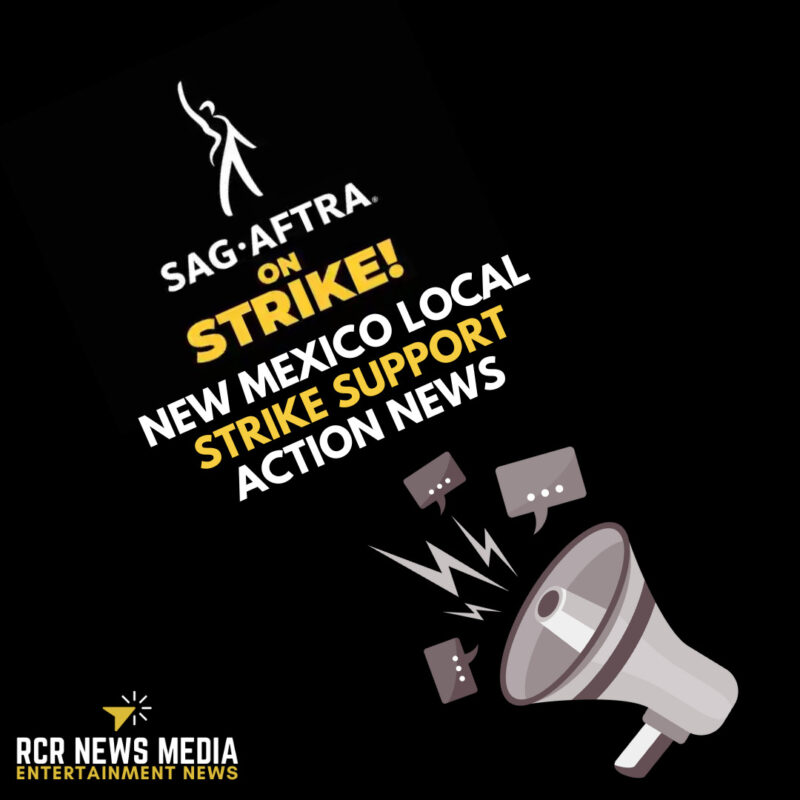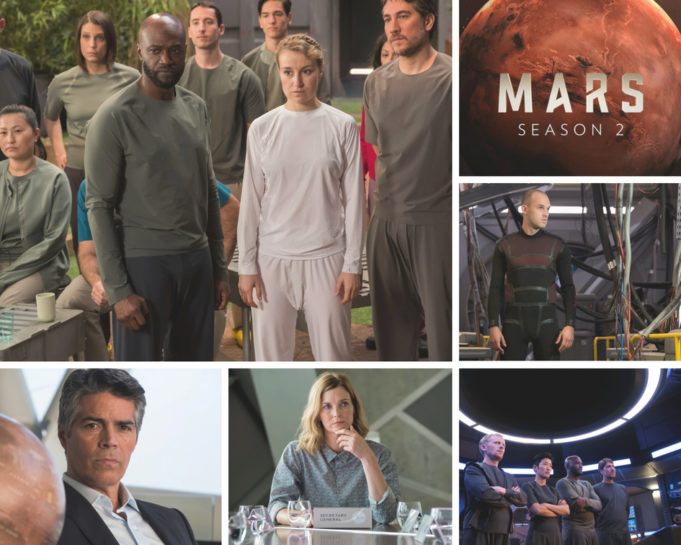Interviews by Jennifer Ortega, Red Carpet Report Reporter
follow Jen on Twitter @JenniferEOrtega
Recently, Red Carpet Report’s Jennifer Ortega attended the TCA’s for the National Geographic Channel. The much anticipated Season 2 of Nat Geo’s Mars will premiere in November. Season 2 of MARS returns with a hybrid, six-episode arc that alternates between scripted drama and documentary sequences to predict what life will be like on the Red Planet forecasted by what’s happening now on Earth. The most intriguing aspect of the series is that Nat Geo enlisted the help of top scientists and astronauts to make the show as factual as possible. Jennifer was able to ask the talent questions as well as some of the Big Thinkers of Mars 2.
Roundtable Discussion
• Actor Esai Morales stars in Season 2 as Roland St. John, the CEO Lukrum Industries. Esai is known for his roles in Ozark, NYPD Blue, Caprica & How to Get Away with Murder.
• Producer Justin Wilkes is known for Metallica: Some Kind of Monster, My Next Guest Needs No Introduction with David Letterman and What Happened, Miss Simone?
• Dr. Mae Jemison is a show consultant, a physician, engineer and social scientist. She served six years as a NASA astronaut and was the first woman of color in the world to go to space.
Esai, what’s it like walking into the second season. You are part of the private sector. You’re a CEO of the industry.
Esai Morales: I’m secretly jealous that I’m not in space, but I’m very happy that I’m pulling strings that will make what happens there either permanent or a nice try. It’s a really interesting character in that, I was just talking to Dr. Mae, I was saying you know I took the personality and biorhythms of sorts and egos of people like let’s say Elon Musk, a visionary, Richard Branson, an entrepreneur with style and a Dick Cheney kind of. You know, I mean like Halliburton.
That’s a scary combo!
Esai Morales: This is the lucrative Halliburton to some degree. And for me it is amazing. I mean it’s a little intimidating as an actor to go to a planet someone else you know kind of colonized first and make your own mark. But you know these are professionals. This is a well-oiled machine. Now after it’s the first season which I hear kind of grew organically, developed from documentary to a docudrama in a sense. And I’m just an old science buff. I like knowledge. I like searching for things in today’s era. When we turn on the television, for the most part, you’re being put to sleep. You’re literally, you know being conditioned. Certain parts of your brain are being affected so you can become a good consumer where you apply the same sort of social agenda and I resent that. So for me, Nat Geo is the perfect home for someone who wants to water their mind with significance and things that have meaning that could affect your life and the lives of others. So I’m honored to be here.
So as an actor what’s the pressure like being on the set when you have all these phenomenal experts like Dr. Mae Jemison and astronaut Leland Melvin? I mean, this isn’t your normal press room.
Esai Morales: Well, you know thank God. Although no, I don’t mind. I picked their brains if could and if I’m not making them laugh. I like absorbing. We could have that on set. I’m from Earth. I’m on Earth all time during the show so I didn’t need that kind of technical advisers to play this kind of human being. But it is dynamic in other words. Somebody asked me before what did you learn and I know how easy it is to justify the positions of these people when you know, yesterday we were debating about science, industry, who comes first. It’s like the chicken and the egg. It’s like you said today very eloquently, it’s a yin-yang situation. Scientists make up the industry and it’s the people on top who control the direction and the behavior of the characteristics of that industry. And is it beneficial for them.
That’s been a question that you know modern society, modern civilization has asked and answered many times over. We think what the future is going to look like as we go back and look at the past. So when you look at how we even got to the Americas to begin with.
Was that a government-funded enterprise or was it a privately funded enterprise? There are so many instances where it was private enterprise that was leading scientific exploration for monetary purposes as well as exploration purposes, setting up civilizations, setting up colonies. And that’s what I think fun about this docudrama is that you get to explore both sides that you know from an audience standpoint.
Dr. Mae Jemison: And it’s a perspective we’ve been talking about, Mars and human presence on it. I’ve like to stay away from the word colony because it has some really difficult meanings about human migration. So in communities when you start to look at it really again, it becomes a perspective of when we talked about there being scientists and industrialists in every place. But who gets to make those decisions? And I think that that’s at the heart of Mars and very much in Season 2 is who’s getting to make these decisions.
I always think are we going to repeat the same mistakes we made here.
Esai Morales: But where we go we take our problems with us and that’s what’s interesting about our evolution and our lack of evolution. One interesting analogy that I haven’t really talked about much was when the New World was discovered, a big part of that justification was the saving of souls. And the irony that I find you and might want to pour some of that coffee on me because of it…I’ve been a science buff my whole life. And I noticed patterns and I noticed that we talked about dogma yesterday. And religion was used to open up the New World. It was the justification. And I think if you’re a rapacious soul who wants control the power of science it’s the dogma that is used. You don’t really believe it. You see, you let the scientists go. We want to benefit mankind. And in the back, you’re going and I’m going to make a lot of money to control this market and we’re going to be here first and everyone else is going to play by our rules. So there’s that kind of…but you don’t play that. You just you know. So I think it’s interesting that science itself as the opposite of religion can become a religion in and of itself.
Dr. Mae Jemsion: So we’re not going to have this discussion because I think that there’s a combination of both. They’re both belief systems yes. Right. But one talks about why, one talks about how, but we’re not going to, I’m not going to do that deeply because I think you’re right. The perspective is what do people use and that’s what we come back for. I want to just do one thing. When I was asked the first year how I got involved. I was asked to be one of the big thinkers on camera. And so just having this conversation is like well you know I do interviews all the time. I really am very interested in what happens behind the scenes and how the characters are built and how the scripts are written so that I’m not talking to the TV or to the movie screen. So Justin said well what would you like to come on and help with? Like the crew and things like that and look at some of the scripts?
So I was really excited because what happens in Season 2 and what I was thrilled about is what’s been imbued in the scripts. It’s the science that we can imagine things that have a reality. You can sit down watch them the programs and not be less informed because you watched it. You learn things and I think that that’s really very powerful about the series that you can sit there and you come out and you come out also with imagination and understand that there are human dramas that technological development doesn’t happen in a vacuum it happens because people make decisions. They make decisions and that may not be the folks who are making decisions that are in the world’s best interest. They’re making decisions and that’s the reason we have to so many people.
Justin, what’s your take on Season 2?
Justin Wilkes: We made a conscious decision this season especially we wanted to reflect the times, we wanted to reflect the sentiment, the mood of this country and the world right now. Because all the same questions are being raised. This is playing out in the Arctic. This is playing out in parts of Russia. This is playing out in Greenland and it’s is playing out in the science. It’s playing out in the ocean. So all of that informs our storyline. So the hope is that when you watch it you really do see this one to one parallel of are we going to make the same mistakes or we are destined to make mistakes and maybe take a moment to just take stock and say we’re starting a new place. Let’s take a break and just understand it for a second. Before we just we just go in there and do what we’ve done so many times before.
Do you think the millennials will take hold of this series? Esai, your daughter, you brought up your daughter here. What is your hope for her?
Esai Morales: Putting her through college. It’s expensive.
Laughter
Dr. Mae Jemison: You know I think the power of telling a story where you have characters involved is people can see themselves and get involved with the story. So you could have that discussion that you would not have been able to have if you just put it in the form of talking heads like saying in a documentary. You capture more people because they can put themselves in there.
Justin Wilkes: And there are people in the audience who will watch as that will end up going to Mars well within their time frame. They might be part of the first mission.
I think right before we were talking about how this series will inspire just like a generation of girls to get involved in science and space just in the fact that you have in character that is a powerful Asian woman that you don’t see very often. It’s the year 2018 and like finally we’re getting more inclusive TV. But especially with a series like Mars, I think it’s important that there’s so much science behind it. I mean that’s incredible. And like you said it’s not like it some sitcom.
Justin Wilkes: Yeah. Yeah, well it’s going to take…I mean in real life it will take a culturally ethnically politically diverse group of people who are going to get us to the planet to begin with. And then once we’re there, there will be even more people that are going to go to it. And Dee Johnson (Producer), I know you’ve spoken to her.
Oh yeah, she’s amazing!
Justin Wilkes: One of the things that she was the most excited about joining this project was that she could she could both embrace characters that we had we had created in Season 1, but then introduce even new characters and new storylines for old characters where a strong female minority leadership is out in the forefront. This doesn’t exist on TV as much as it should. And we want to embrace that.
Esai Morales: I wonder that was a little afraid at one point when considering you know really doing the project and it looked like this might happen. My concern was are we being conditioned because I didn’t know any of these guys before so I didn’t know what the hidden agenda was. I always look for a hidden agenda in anything. You know even parables all have some kind of a story. Are we getting ready to go to Mars because we’re going to trash Earth? I think about my character. You know the super rich they have a certain thing about themselves. They value themselves more than the people that populate their wealth and make it possible. And I was just, I was you know nervous about that. But you know when you read the script and you hear the stories and it’s like this is a real broad swath of humanity and I’m like well if it is, I said let people think about it, but look to see them come up. This is a project where people like I said, yes the whole family can talk about. It’s not like OK this is all for grandpa or the nerdy geek. This is a family show. And that’s what I like about Nat Geo. I’ve watched nature shows with my daughter on Nat Geo and it’s just like a great time to bond when technology is has separated us. You go to a room and you know people are like this on their phones.
Dr. Mae Jemison: So one of the things that I was just going to mention when we start to talk about this the reason why this space is so powerful is because around the world every society has looked up to the stars. And we wonder where they are. They’ve been part of our mythology, they’ve been the underpinning of who we are as a society so we are able to go to Mars because thousands of generations ago somebody figured out that this speckle, the sky was moving relative to the other. So I think it’s that really that that connection. How are we going to manage not to trash this planet is by being connected to it and I’m segwaying into something because I probably mentioned it to you guys before which was a project we’re doing called Look Up which is really about looking up at the sky and just wondering and reconnecting. How do we not trash this planet is by realizing we are associated with it. And so Mars the fascinating thing about Mars is that you can look back at the Earth to see that it’s a planet and I think this season will be what it’s like from being Earthlings into being a Martian. What does that mean? But at least we have to know how to be Earthlings first?
Esai Morales: I would be a Martian American.
Now I know what to call you! Thank you guys so much!
Roundtable Discussion with
• Casey Dreier is a Big Thinker on the show. He is the Director of Space Policy at The Planetary Society. Casey is an expert on space and Mars exploration policy, geopolitics, robotic missions to Mars, the commercialization of space and human spaceflight history.
• Showrunner & Executive Producer Dee Johnson has had a career as a writer that has spanned nearly three decades. She has worked on ER, Nashville, and The Good Wife.
• Actress Jihae stars as Hana Seung, Mission Commander of Olympus Town. She effectively has been the sole person in charge of a planet for almost a decade. Jihae is also a critically acclaimed musician.
• Leland Melvin is a Big Thinker on the show. He is an American Engineer and a former NASA astronaut. He flew two missions on Space Shuttle Atlantis.
Dee, can I ask you a question? As a showrunner and as an executive producer, I know you’ve done incredible work before. How did you get connected with Mars? And what drew you in?
Dee Johnson: Well, you know I looked at Season1 and it was a very unique show. I’ve heard there are other shows like it, but there was nothing like it to me. The combination of the documentary and the scripted parts, which is you know, I mean it’s a cool thing and there is an allure to it. So those two things together. I watched that and I loved it honestly. I love Jihae (starring actress) and I loved the idea of exploring leadership, female leadership in particular, on another planet. I mean she’s in charge of the planet. I thought that was really fascinating to get into and explore in Season 2.
Leland Melvin: Can I add something to that? When I was in space I had my first commander who was a female commander and Dr. Peggy Whitson, who was just this amazing person and she made sure that we were comfortable, she made sure that everything was going right instead of us having to take, you know, I was in charge of transferring items from the shuttle to the space station. So instead of me having to find every little nook and cranny to store stuff, she said, no just put everything right here and we’ll take care of it later. When we had the meal it was in the Russian segment, we were breaking bread going 17,500 miles per hour. And it’s like I’m in someone’s home with Russian, German, French, African-American, Asian-American peers, this is when I had my perspective shift. So when I watch Season 1 and I saw Jihae became the commander and it was like I was feeling like I was back in space. So Jihae, you just channeled your character so well. It was beautiful.
Dee Johnson: It was of definite interest to me. I mean it was..she did such a great job of just having strength with all this pressure on her. I thought it was compelling. And that was great. And there wasn’t really anybody out there just looking in the television landscape that was like her. And my own heritage was, yeah go!
Kind of a quick clarification question. I was kind of curious what kind of demographic age group you think is going to be interested in the show.
Dee Johnson: You know I think this show is pretty accessible. I don’t know what the demographics were last season. It did really really well, you know better than I, but it’s very accessible. In fact, we were talking about it the other night. Yeah, I think it’s a show…I mean this is not going to sound the way it should, but it really is a show the entire family can watch because it isn’t like you know crazy filled with profanity or whatever. But there’s a lot of intense stuff that applies to our lives currently that can actually just you know spark some debate. So I think that on the low end I don’t know. I mean I have teenage sons and they think I’m finally doing a show that is cool. Yeah, and it’s also sort of really enticing. It’s a world that you don’t often see on television and we have a great VFX house that did some amazing work creating this landscape.
I have a question for Casey because Season 2 delves a lot more of the private sector and industry so that’s kind of your area of expertise. So how much did you work with the show to create kind of a realistic look at what this possibly will look like?
Casey Dreier: Well I spoke with Dee early on in the writing process and I was probably one of many people she spoke with.
Dee Johnson: But your conversation was really key. Because it was about who owns Mars.
Casey Dreier: Yes and how you can assert ownership and the implications of what ownership means. Ownership ultimately comes back to who can assert the authority to retain that ownership. And so it was fun talking with them. I recorded the show and I think that the real science adviser would be Stephen Petranek in that sense. But I had my small but delightful role to play in the show and I’m really happy.
Leland Melvin: You were really impactful.
Casey Dreier: Well, thank you.
Do you hope that this marks a deeper interest in college students as far as the influence when they choose their career or their major masters program?
Jihae: I mean I think that could be. I’m sure that influence can happen. I think what’s really amazing is that it’s really the only show that marries entertainment with science and knowledge. That’s something we really need in our culture and in a way, it’s a contribution to our society. We need that. Leland, how old were you…you said you were four when you saw Star Trek and you thought you could be an astronaut. I mean that’s incredible.
Leland Melvin: I never thought I could be an astronaut. That didn’t happen until much later on. But there was a guy who watched Star Trek and saw Lt. Uhura as the first African-American woman in a leadership role in television and he said if there are women like that in space I want to go. And that was astronaut, Ron McNair. I mean this is something that you allow people to see this strong powerful role and young girls will look up you, Jihae, and say I can do that too. That’s so important. I mean it’s like I can’t see it enough. And then having the big thinkers talking about the realities of that coupled with the dramatic acting and the beauty and the tension it’s a great marriage to make kids want to go.
Casey Dreier: Yeah, I guarantee you that people will change their lives and pursue science and space because of the show. My wife herself is a planetary scientist and she was greatly influenced by Apollo 13. She was the right age for that and said oh when you see Ron Howard, which I’m sure I’ll hang out with him all the time, but tell him I became a scientist because of Apollo 13. When you talk to students and when students watch your show at this age and they see the optimism and the potential and you just look at the world’s outlay to them, you will change some lives. Very few shows can make that claim.
And just this morning I don’t know if you heard about the water on Mars.
Jihae: Yes and it happens to be a huge part of Season 2. Did you guys get to see any of Season 2 yet?
Yeah. Yes.
Dee Johnson: There was a lot of thought behind it, but that became the resource for Season 2. Life and death for humans is water. It’s all about the water. And then that news being released today.
So to live on Mars you need to make it hotter. Of course, oxygen and everything is right next to it in terms of like how we heated our own planet in terrible ways. Is there going to be other more creative ways to heat up Mars?
Casey Dreier: Yeah, I mean if Mars only had oil we could burn it all there and it would actually be great for Mars because you would actually add the necessary global warming you need. It is a lot easier if there is oil, but there’s not oil there. Now we need other ways to add stuff to the atmosphere and that’s obviously what you start to explore in the show.
Thank you so much!
Roundtable Discussion
• Stephen Petranek is a Co-executive Producer, Scientific Advisor and Big Thinker. He is an Award-winning journalist; Author of How We’ll Live on Mars, upon which the series is based. He is the lead voice for Mars missions and colonization.
• Antonia Juhasz is a Big Thinker on Mars. She is an author, investigative journalist and an award-winning policy analyst with an expertise in in oil and energy and the parallels of potential resource extraction on the Red Planet
• Actor Jeff Hephner stars in Season 2 as Kurt Hurrelle, the leader of the Lukrum Industries mining colony. Jeff has also appeared on Chicago Fire, Chicago Med and Code Black.
You wrote the book, Stephen, which is brilliant, the book that Mars is based on. Since we got the news today about water on Mars and speaking about water extraction. Is water extraction going to be a huge monetary component on Mars?
Stephen Petranek: Water is the most precious element by far on Mars. Water is Rocket Fuel separated into Hydrogen and Oxygen with the electric current and you can get back to Earth if you need to. Water is also central to life. We know there’s tons of water on Mars locked up in the ice, enough that if it all melted the planet would be a thousand feet deep in water and just today we had a report of an actual, we think an underground lake of water. But to finish answering your question, Antonia can go into why that’s significant in the show.
Antonia Juhasz: There’s a couple of different issues that the show presents. One is the commercialization of resources for asteroid mining or mining on Mars that could potentially be profitable back on Earth. The more central question in the show is how will resource extraction take place on Mars. So in the show while water is found and a private company arrives and Jeff (who plays Kurt) leads the mining effort to extract the water and the question that this presents is will the method of mining, will the decisions that are being made by the private company be driven by doing it the fastest way possible, doing it with ignorance or lack of caring about the impacts on the planet, any species that may live on the planet and the humans that are on the planet and their ability to stay there or just get the resources get it fast and potentially make a profit in a you know Mars colony that generates money. But right now just how are you going to get the resources? So if you translate that from fossil fuel extraction on Earth which the show goes back and forth between fossil fuel extraction on Earth and the problems created here and then water extraction on Mars that that model has led has had devastating consequences. So it has led to looking out at vast areas for example, an ocean and seeing nothing but a place to get oil from instead of seeing that if you pollute that ocean you can kill things like phytoplankton which provide something like 50 percent of the oxygen we need on Earth to live. So if you do that again on Mars are you going to pollute the only water system that we would have to live on? Are you going to make it so that humans can’t live on Mars?
So is it that the financial plan competes with the 100-year plan to terraform Mars?
Stephen Petranek: No, there’s the competition over Mars. It will always be between scientists who want to keep it as a scientific park because we can learn so much about Earth from Mars because Mars was like Earth a billion years before Earth was and now Mars is a cold vast desert that can happen to Earth and Venus represents kind of the opposite problem as a super hot place that went wrong. And Mars represents the other the other equation that could happen on Earth. If you keep polluting Earth and you keep filling the air with carbon dioxide you end up like Venus or possibly depending on what Earth’s reaction is to that kind of atmospheric pollution you could end up like Mars. We don’t know the answer to that. This planet as an experiment and we have evidence and two other planets of that experiment going bad.
Antonia Juhasz: There’s the scientific component of maintaining the planet as a place for scientific research. Then they’re also because we have a colony arriving there is the question of will the planet be sustainable to human beings living there. And that’s what we’ve done wrong here is create a planet that is no longer sustainable for the majority of us and in a meaningful way. And will we repeat that again.
Jeff, I have a quick question. What’s it like to come on this season to a show that I think is so special because Nat Geo brings in all these experts that your typical everyday show doesn’t?
Jeff Hephner: For me as an actor it’s so much different. We were just talking about it outside because typically if you’re playing a TV doctor we’re not having these kind of conversations. Then to be in proximity to people who think this way and to get to add my two cents to the stories. So they lay this out with their imaginations and I get to help being part of the story that brings it to some kind of fruition at least visually and as an actor that’s what I wanted to do. I wanted to interject myself into those parts, into those stories and I get to do that and stuff that’s based in fact, that’s based on hope, that is optimistic and something that could very well come true. It’s nuts.
I mean to have people like Leland, Stephen and Antonia and Casey…It’s crazy.
Jeff Hephner: I have pictures of me with astronauts now. It’s really cool and you get around really accomplished people and then these debates spark and then the conversation goes and you can get lost in it and you can go for a very long time because so much of it is just projection based in fact, but still isn’t quite done. And so it opens and then you get differing arguments of what’s right and what’s wrong. Who’s going to be the asshole. So my character gets to come in and for some, he’s going to be just that guy, right? And then the others are kind of, you can say there’s a school of thought that we wouldn’t have this conversation if we didn’t have people extract fossil fuels and take advantage of them and create a society in which we all live in and participate right now. Is that a bad thing? Yeah, we’ve made mistakes, but guess what. People are healthier, they live longer, they’re happier. You could go down that rabbit hole too. So this show provides a platform to judge both those schools of thought. I love being apart of it.
So Stephen mentioned that there’s enough water on Mars locked in ice that if it would all melt it would be like a thousand feet deep. The first question is given the atmosphere of Mars how difficult would it be for us with our powers to significantly screw up the atmosphere? And then what would the ecological collapse look like with the giant tsunamis?
Stephen Petranek: Well it’s a little complicated because what we have to create on Mars to make it more livable for humans is we have to warm it up. The way you warm it up…There are a number of ways, but one of the lowest-tech ways is to build a giant mirror in orbit around Mars that reflects the sun’s rays on the South Pole or the North Pole where the significant amounts of carbon, frozen carbon dioxide, that is barely frozen, it’s only a few degrees below the freezing point for carbon dioxide. You warm it up just a little and it goes into the atmosphere which is now already 95 percent carbon dioxide and you start making it denser and you create a runaway greenhouse effect because the solar rays now that hit the surface of Mars and produce heat that then bounces back into the atmosphere and goes off into space will be trapped under this layer of denser carbon dioxide. And as we know from the experiment we’re conducting on Earth carbon dioxide is a huge greenhouse gas. You could actually create a runaway greenhouse effect that warms Mars up to the point where much of that ice would begin to melt and you’d have rivers and lakes and oceans on Mars. And because the atmosphere is CO2 and plants like CO2 a lot you’d probably be able to come up with all kinds of hybrid plants that would produce, that would take in a lot of that CO2 and pump out oxygen. That’s partly how we got our oxygen on Earth.
Jeff, with being around all this science–
Jeff Hephner: I get smarter by the minute.
Laughter
I was going to say do you find that intimidating when you’re when you’re slipping into character? How do you get into that zone?
Jeff Hephner: Well luckily the character doesn’t have to be that smart and the character has to be in a sense a cowboy or stereotype. You know the archetype that we think of, forgive me, as the guy who goes up there and he’s going to get the job done and wholly believes in his crew. Me and my crew are going to do well for us. And guess what. You don’t know. This is good for you. And so far from a character standpoint it’s neither here nor there, as an actor and as someone who hopes to absorb as much as possible and observe it. It’s enlightening, it’s fascinating because just to be around the conversation and to realize what really works, I was oblivious to 90 percent of everything I learned being a part of this project and it’s just fun. I wish people can have as much fun as I do at their job. So I wish I could do it longer.
Antonia Juhasz: And Jeff’s character is written, I wrote a book on the BP Gulf oil spill and Jeff’s character, what he says are the same words those people were saying. I mean it’s written perfectly.The decisions to move faster, to get it done and to use explosives. It is a real-life representation of how those decisions are made. And I’ve met a lot of those people and who those people are. It’s true, there is a real cowboy attitude and an attitude of also I’m taking risks to provide a resource that people need so go complain about it to somebody else. This has to get done.
Jeff Hephner: It’s Jack Nicholson like you want me on that wall. It’s that whole speech from A Few Good Men. Those guys embody that and obviously, we all know that that archetype. We know that person and they are central to our story. I mean we’ve got, like it or not we have those people and we have to decide if we want them on our wall and if they need to be on our wall and the guy who doing it believes that and that again brings us to the debate that the show can spark and the arguments that we can have because we are projecting this all onto some form of fantasy still and to have kids talk about it…my kids are talking about it and that’s great. But even more so to have adults have some kind of conversation and come to the sense that we’re really going to do this. This is going to happen.
Is the show going to explore the idea of not only extracting water on Mars but doing it in comparison to what we’ve done to Earth where we have no control anymore?
Stephen Petranek: So that’s changing a lot faster than you think and part of it is based on some of the technology that needs to be created to be able to breathe air on Mars. For example, there’s a company called Global Thermostat that can build a machine at a very low price that can suck CO2 out of the air on Earth. If you build a thousand of those machines in place you could put them anywhere, but if you place them around the Earth you could actually absorb and put away all the CO2 that’s created on Earth.
So technology is getting to the point where we may be able to without making a mistake and a mistake is easy to make, but we may be able to convert the atmosphere on Mars and take a whole planet and make it livable like Earth. And the knowledge that we gain from doing that is going to help us control what’s going on on Earth and to understand the forces that are occurring on Earth. 115 years ago nobody was flying in an airplane. When we’re looking at Mars and we’re looking in terraforming Mars, we’re looking at a period of 300- 400 years. Knowledge is doubling twice as fast as it was seven years ago. Our ability to come up with technologies to probably control our home planet and Mars are likely to happen.
Antonia Juhasz: Alternatively, there is also one of the stories that plays out on Mars is essentially indigenous knowledge that develops from the team that’s been there. That first Mars team that arrives, they’ve been there for nine years. They know the planet better than the private company that arrives. They have a closer relationship to it. They want to protect it which is similar to thousands of years of human history where there are people who do have a great deal of knowledge on planet Earth living sustainably on planet Earth and have a great deal to teach us if we will listen about how to do that back.
Jeff Hephner: It’s Broadway…Manhattan’s Broadway was a trail that went with the contours of the land that eventually was just paved over and made the busiest street in the world. And that’s essentially what’s going to happen or could happen. Do you take the colony that it was their first and they have a relationship to the planet and then there’s going to be a group that comes and just paves it over.
Stephen Petranek: Mars is going to happen in the near future. Private companies can get to Mars. You don’t need a government anymore so it’s going to happen. We’re going to mine asteroids. That’s real. It’s really going to happen in the near future.
Is Space X at the front of it?
Stephen Petranek: SpaceX is the front of being able to build a rocket that makes it possible to get to Mars. They have one mission statement and one mission statement only as a company which is to build a sustainable society on Mars. Sustainable. In other words, you don’t need to send anybody back to Earth or get anything from you. That’s a that’s a tall order.
MARS Premieres November 12th, 2018 on the National Geographic Channel
Six-Part Hybrid Event Series (futuristic dramatization with documentary sequences)
Fall 2018, Season Two
Of all the planets in our solar system, none has captured our collective imagination like Mars. In season two, it’s the year 2042 and the International Mars Science Foundation astronauts have developed Olympus Town into a full-fledged colony. But by this point, they cannot continue to rely solely on government financing, so the doors of opportunity have swung wide open to the private sector. This season, MARS delves into the friction between science and industry. The series examines the impact that humans have on the red planet — and the impact it has on us. The mission to terraform a virgin planet comes with its risks, rewards and myriad considerations. Are we doomed to repeat the same mistakes? Will our struggles and opportunities on Mars tomorrow reflect those we’re making on Earth today?
About National Geographic
National Geographic is the world’s premium destination for science, exploration, and adventure. Through their world-class scientists, photographers, journalists, and filmmakers, Nat Geo gets you closer to the stories that matter and past the edge of what’s possible.
Get More National Geographic: Official Site: http://bit.ly/NatGeoOfficialSite Facebook: http://bit.ly/FBNatGeo Twitter: http://bit.ly/NatGeoTwitter Instagram: http://bit.ly/NatGeoInsta
Photo credit: NATGEO Mars
















